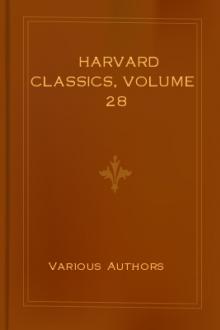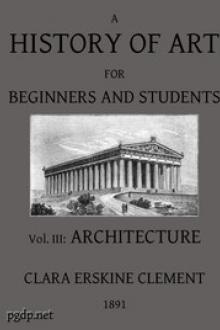Chronicle and Romance, - [ready to read books .TXT] 📗

- Author: -
- Performer: -
Book online «Chronicle and Romance, - [ready to read books .TXT] 📗». Author -
Thus the prince and his company did so much that they passed through Poitou and Saintonge without damage and came to Blaye, and there passed the river of Gironde and arrived in the good city of Bordeaux. It cannot be recorded the great feast and cheer that they of the city with the clergy made to the prince, and how honourably they were there received. The prince brought the French king into the abbey of Saint Andrew's, and there they lodged both, the king in one part and the prince in the other. The prince bought of the lords, knights and squires of Gascoyne the most part of the earls of the realm of France, such as were prisoners, and paid ready money for them. There was divers questions and challenges made between the knights and squires of Gascoyne for taking of the French king; howbeit Denis Morbeke by right of arms and by true tokens that he shewed challenged him for his prisoner. Another squire of Gascoyne called Bernard of Truttes said how he had right to him: there was much ado and many words before the prince and other lords that were there, and because these two challenged each other to fight in that quarrel, the prince caused the matter to rest till they came in England and that no declaration should be made but afore the king of England his father; but because the French king himself aided to sustain the challenge of Denis Morbeke, for he inclined more to him than to any other, the prince therefore privily caused to be delivered to the said sir Denis two thousand nobles to maintain withal his estate.
Anon after the prince came to Bordeaux, the cardinal of Perigord came thither, who was sent from the pope in legation, as it was said. He was there more than fifteen days or the prince would speak with him because of the chatelain of Amposte and his men, who were against him in the battle of Poitiers. The prince believed that the cardinal sent them thither, but the cardinal did so much by the means of the lord of Caumont, the lord of Montferrand and the captal of Buch, who were his cousins, they shewed so good reasons to the prince, that he was content to hear him speak. And when he was before the prince, he excused himself so sagely that the prince and his council held him excused, and so he fell again into the prince's love and redeemed out his men by reasonable ransoms; and the chatelain was set to his ransom of ten thousand franks, the which he paid after. Then the cardinal began to treat on the deliverance of the French king, but I pass it briefly because nothing was done. Thus the prince, the Gascons and Englishmen tarried still at Bordeaux till it was Lent in great mirth and revel, and spent foolishly the gold and silver that they had won. In England also there was great joy when they heard tidings of the battle of Poitiers, of the discomfiting of the Frenchmen and taking of the king: great solemnities were made in all churches and great fires and wakes throughout all England. The knights and squires, such as were come home from that journey, were much made of and praised more than other.
WAT TYLER'S REBELLION
HOW THE COMMONS OF ENGLAND REBELLED AGAINST THE NOBLEMEN
In the mean season while this treaty was, there fell in England great mischief and rebellion of moving of the common people, by which deed England was at a point to have been lost without recovery. There was never realm nor country in so great adventure as it was in that time, and all because of the ease and riches that the common people were of, which moved them to this rebellion, as sometime they did in France, the which did much hurt, for by such incidents the realm of France hath been greatly grieved.
It was a marvellous thing and of poor foundation that this mischief began in England, and to give ensample to all manner of people I will speak hereof as it was done, as I was informed, and of the incidents thereof. There was an usage in England, and yet is in divers countries, that the noblemen hath great franchise over the commons and keepeth them in servage, that is to say, their tenants ought by custom to labour the lords' lands, to gather and bring home their corns, and some to thresh and to fan, and by servage to make their hay and to hew their wood and bring it home. All these things they ought to do by servage, and there be more of these people in England than in any other realm. Thus the noblemen and prelates are served by them, and especially in the county of Kent, Essex, Sussex and Bedford. These unhappy people of these said countries began to stir, because they said they were kept in great servage, and in the beginning of the world, they said, there were no bondmen, wherefore they maintained that none ought to be bond, without he did treason to his lord, as Lucifer did to God; but they said they could have no such battle,[55] for they were neither angels nor spirits, but men formed to the similitude of their lords, saying why should they then be kept so under like beasts; the which they said they would no longer suffer, for they would be all one, and if they laboured or did anything for their lords, they would have wages therefor as well as other. And of this imagination was a foolish priest in the country of Kent called John Ball, for the which foolish words he had been three times in the bishop of Canterbury's prison: for this priest used oftentimes on the Sundays after mass, when the people were going out of the minster, to go into the cloister and preach, and made the people to assemble about him, and would say thus: 'Ah, ye good people, the matters goeth not well to pass in England, nor shall not do till everything be common, and that there be no villains nor gentlemen, but that we may be all united together, and that the lords be no greater masters than we be. What have we deserved, or why should we be kept thus in servage? We be all come from one father and one mother, Adam and Eve: whereby can they say or shew that they be greater lords than we be, saving by that they cause us to win and labour for that they dispend? They are clothed in velvet and camlet furred with grise, and we be vestured with poor cloth: they have their wines, spices and good bread, and we have the drawing out of the chaff[56] and drink water; they dwell in fair houses, and we have the pain and travail, rain and wind in the fields; and by that that cometh of our labours they keep and maintain their estates: we be called their bondmen, and without we do readily them service, we be beaten; and we have no sovereign to whom we may complain, nor that will hear us nor do us right. Let us go to the king, he is young, and shew him what servage we be in, and shew him how we will have it otherwise, or else we will provide us of some remedy; and if we go together, all manner of people that be now in any bondage will follow us to the intent to be made free; and when the king seeth us, we shall have some remedy, either by fairness or otherwise.' Thus John Ball said on Sundays, when the people issued out of the churches in the villages; wherefore many of the mean people loved him, and such as intended to no goodness said how he said truth; and so they would murmur one with another in the fields and in the ways as they went together, affirming how John Ball said truth.
The archbishop of Canterbury, who was informed of the saying of this John Ball, caused him to be taken and put in prison a two or three months to chastise him: howbeit, it had been much better at the beginning that he had been condemned to perpetual prison or else to have died, rather than to have suffered him to have been again delivered out of prison; but the bishop had conscience to let him die. And when this John Ball was out of prison, he returned again to his error, as he did before.
Of his words and deeds there were much people in London informed, such as had great envy at them that were rich and such as were noble; and then they began to speak among them and said how the realm of England was right evil governed, and how that gold and silver was taken from them by them that were named noblemen: so thus these unhappy men of London began to rebel and assembled them together, and sent word to the foresaid countries that they should come to London and bring their people with them, promising them how they should find London open to receive them and the commons of the city to be of the same accord, saying how they would do so much to the king that there should not be one bondman in all England.
This promise moved so them of Kent, of Essex, of Sussex, of Bedford and of the countries about, that they rose and came towards London to the number of sixty thousand. And they had a captain called Water Tyler, and with him in company was Jack Straw and John Ball: these three were chief sovereign captains, but the head of all was Water Tyler, and he was indeed a tiler of houses, an ungracious patron. When these unhappy men began thus to stir, they of London, except such as were of their band, were greatly affrayed. Then the mayor of London and the rich men of the city took counsel together, and when they saw the people thus coming on





Comments (0)